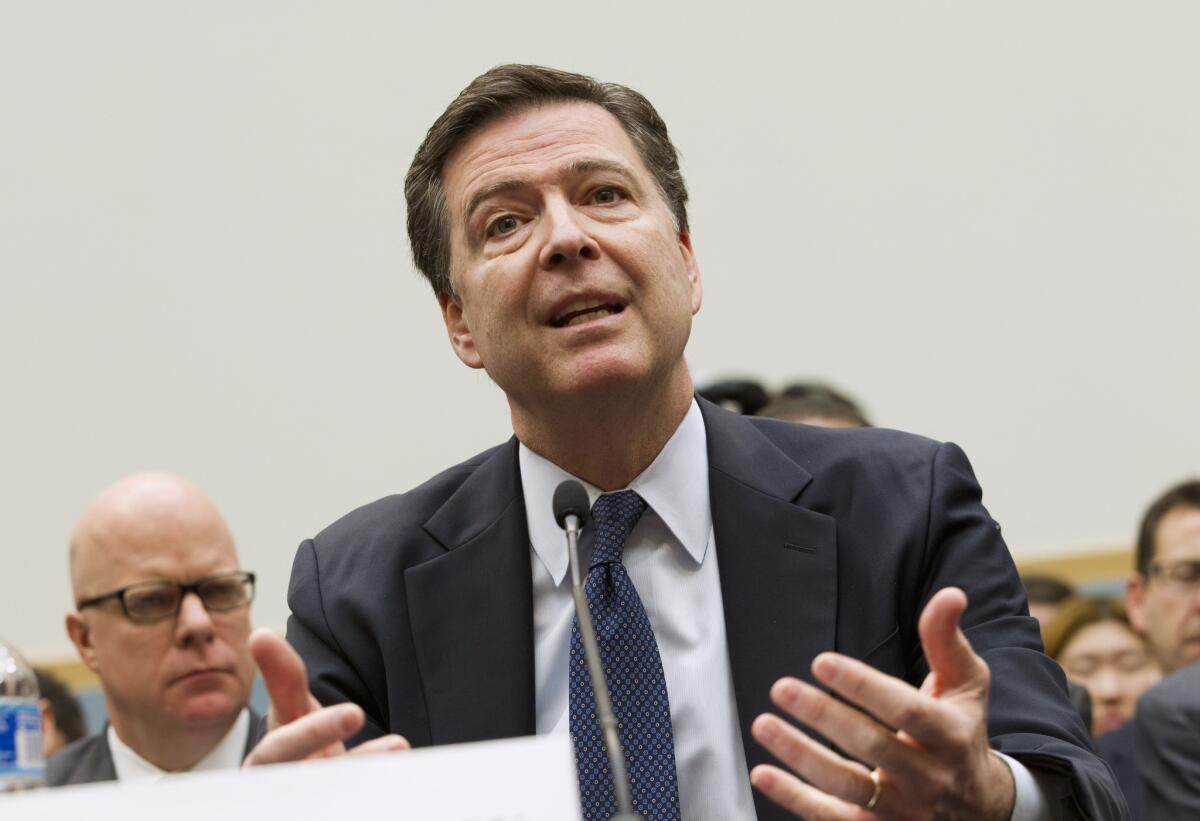FBI isn’t the only agency that failed to unlock the San Bernardino killer’s iPhone

FBI Director James B. Comey told lawmakers Tuesday that his agents have “engaged all parts of the U.S. government” to try to get into San Bernardino shooter Syed Rizwan Farook’s work iPhone -- with nothing to show for it.
The comment counters public speculation about whether the agency had asked cybersecurity forces at the NSA, CIA and the Pentagon to help circumvent a passcode and other security features of the terrorist’s iPhone 5c.
Comey didn’t name agencies, but noted that all options have been exhausted, including assessing a flood of email suggestions from the public. There’s no way to get a complete copy of the data on the passcode-locked iPhone 5c running the iOS 9 operating system without Apple’s help, Comey said.
Federal prosecutors had said in another iPhone-unlocking case that investigators don’t have an obligation to consult with other agencies. The comment prompted a critical response from the judge in a ruling issued against the government Monday.
In considering the case, a judge can penalize the government for not proving that other parts of the administration failed to help, U.S. Magistrate Judge James Orenstein said.
“While the government’s hesitation to reveal what its intelligence agencies can and cannot do is entirely understandable ... that does not mean that the choice must be cost-free for the government in this litigation,” he wrote.
FULL COVERAGE: Apple’s fight with the FBI >>
IPhone security experts have said there may be other ways to unlock Farook’s phone, though most of them are untested. The FBI could try to send commands to one of the apps believed to be on Farook’s iPhone and try to create a loophole into the phone. Another possibility would be deactivating the phone and trying to infiltrate during the reactivation process.
But those methods may not be palatable or stand up to court scrutiny because they could contaminate the memory. That risk hasn’t stopped the FBI in other cases, Comey said Tuesday at a House Judiciary Committee hearing about encryption technology. But in the San Bernardino case, the FBI is stumped without Apple’s assistance.
Bruce Sewell, Apple senior vice president and general counsel, agreed during his testimony Tuesday that the company also knew of no other process to defeat the security measures on Farook’s phone.
Even if someone devised a new option, they would be unlikely to sell it to the FBI out of fear a “backdoor” could undermine the security of every iPhone, security researchers said.
“The consensus is that some people in government if you give them an inch, they take a mile,” security researcher Will Strafach said. “I can understand why people are very wary.”
Another researcher, Stefan Esser, said the only “creative illegal” idea that might work is an FBI agent hacking into a key Apple employee’s computer or going undercover as an Apple employee. Doing so could give the FBI access to the unique Apple signature that the agency says is needed to unlock Farook’s iPhone.
Chat with me on Twitter @peard33
See more of our top stories on Facebook >>
MORE ON FBI VS. APPLE
Apple, the FBI, and the Internet of Things: Your whole house is open to attack
The fight between Apple and the FBI moves to Capitol Hill
Apple wins a round in fight over accessing locked iPhones in criminal investigations







